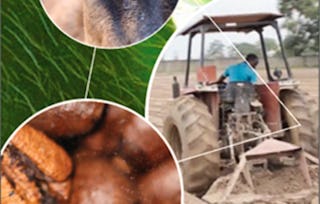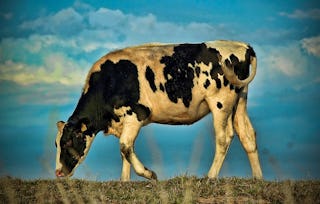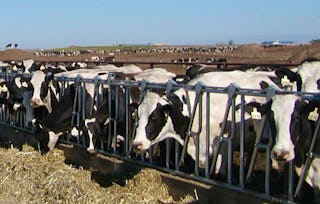This course will explore the concepts driving current food production science (population growth, urbanization, emerging affluence, resource constraints, and underlying biological limits) with the main focus on livestock production. Each of the major food animal species (dairy, swine, beef, and poultry) will be covered in terms of their universal life cycles, constraints to production and emerging societal issues.

Feeding the World

256 reviews
Skills you'll gain
Details to know

Add to your LinkedIn profile
22 assignments
See how employees at top companies are mastering in-demand skills

There are 8 modules in this course
This module introduces the course by discussing the pressing need to address global food security as well as the accompanying challenges and ethical issues. We also explore the role that livestock play in the food production system and review trends in animal production.
What's included
11 videos2 assignments
This module begins to explore the fundamental principles of animal production operations and the issues surrounding animal production. We will look at the efficiency and environmental impact of the food system as well as animal welfare concerns. Finally, we will discuss the importance of water as an essential resource for the food production system.
What's included
6 videos2 assignments
This module focuses on animal feeds and their important role in the animal production system. You will gain an understanding of the constituents in feed as well as how feed is classified. We will also examine and explain how nutrients flow through the environment. Finally, we will look at the problem of food waste and identify solutions.
What's included
9 videos3 assignments
This module continues the discussion of animal production operations by looking at factors that affect farms’ animal yields and environmental efficiency. We will also explore food safety, how and why antibiotics are used in food production, and the importance of veterinary medicine as part of the livestock system. Finally, we will look at the challenges of food security and livestock farming in the developing world.
What's included
7 videos3 assignments
Welcome to the first week of the course which explores a particular animal production sector. The focus for this module will be dairy. The life cycle of a dairy cow as well as the environmental impact of dairy production will be covered. We'll also explore housing systems, milking technologies, trends and animal welfare issues in the dairy production system. Finally we will address public health concerns in dairy production including hormone use, antibiotic use, and milk safety in the U.S.
What's included
9 videos3 assignments
This module will examine the life cycle of market hogs and mother sows in the U.S. swine production system. Swine housing and the rationale behind those facilities will be covered in addition to welfare and the trends and challenges currently affecting the swine industry.
What's included
4 videos2 assignments
This module examines the production system and life cycle of U.S. poultry. We'll address animal welfare issues and emerging challenges and finish the week with a discussion about public health concerns related to the poultry production system.
What's included
4 videos3 assignments
The final module of the course focuses on beef production systems. We will examine the production system and life cycle of U.S. beef cattle. Then, we'll address animal health as well as public health issues. Finally, we'll finish the week with a discussion about the international beef industry.
What's included
11 videos4 assignments1 discussion prompt
Instructors


Offered by
Explore more from Basic Science
 Status: Preview
Status: PreviewUniversity of Copenhagen
 Status: Free Trial
Status: Free TrialStanford University
 Status: Preview
Status: PreviewUniversity of Illinois Urbana-Champaign
 Status: Preview
Status: PreviewThe Pennsylvania State University
Why people choose Coursera for their career

Felipe M.

Jennifer J.

Larry W.

Chaitanya A.
Learner reviews
- 5 stars
80.07%
- 4 stars
15.62%
- 3 stars
3.51%
- 2 stars
0.39%
- 1 star
0.39%
Showing 3 of 256
Reviewed on Jan 6, 2018
Excellent course, excellent teacher. Thanks very much.
Reviewed on Jul 27, 2017
exceptionally interesting course, with a lot I personally found vital to know. thanks so much!
Reviewed on May 30, 2022
Great foundation for understanding the beef industry!!

Open new doors with Coursera Plus
Unlimited access to 10,000+ world-class courses, hands-on projects, and job-ready certificate programs - all included in your subscription
Advance your career with an online degree
Earn a degree from world-class universities - 100% online
Join over 3,400 global companies that choose Coursera for Business
Upskill your employees to excel in the digital economy
Frequently asked questions
To access the course materials, assignments and to earn a Certificate, you will need to purchase the Certificate experience when you enroll in a course. You can try a Free Trial instead, or apply for Financial Aid. The course may offer 'Full Course, No Certificate' instead. This option lets you see all course materials, submit required assessments, and get a final grade. This also means that you will not be able to purchase a Certificate experience.
When you purchase a Certificate you get access to all course materials, including graded assignments. Upon completing the course, your electronic Certificate will be added to your Accomplishments page - from there, you can print your Certificate or add it to your LinkedIn profile.
Yes. In select learning programs, you can apply for financial aid or a scholarship if you can’t afford the enrollment fee. If fin aid or scholarship is available for your learning program selection, you’ll find a link to apply on the description page.
More questions
Financial aid available,

